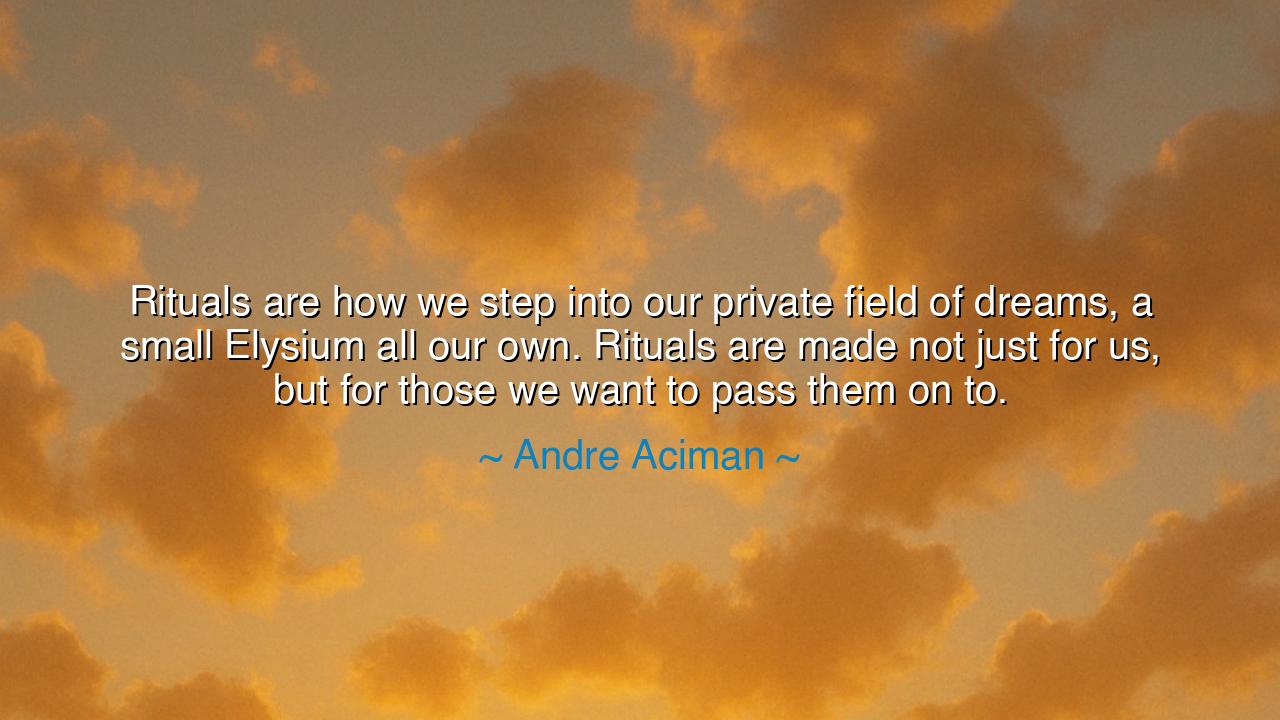
Rituals are how we step into our private field of dreams, a small
Rituals are how we step into our private field of dreams, a small Elysium all our own. Rituals are made not just for us, but for those we want to pass them on to.






In these luminous words, Andre Aciman reveals the quiet majesty of rituals — those sacred repetitions through which human beings touch eternity. To call them “a private field of dreams” is to understand that rituals are more than habits; they are the songs of the soul, composed in the stillness between moments. Each time we light a candle, whisper a prayer, or perform a simple gesture with reverence, we step into a small Elysium, a private heaven shaped by memory, meaning, and longing. In the chaos of the world, ritual restores order; in the silence of solitude, ritual awakens communion.
From the dawn of civilization, rituals have been the language through which humans spoke to the unseen. The ancient Egyptians rose before the sun to greet Ra, washing in the Nile to cleanse not only the body but the spirit. The Greeks laid olive branches upon their altars to honor the gods and remind themselves of virtue. Even today, we echo their sacred gestures — a morning cup of tea taken in silence, a father telling bedtime stories each night, a student sharpening a pencil before study. All these are rituals, quiet acts that anchor the soul in a restless age. They whisper: “Here I am. I belong.”
To say that rituals are “made not just for us, but for those we want to pass them on to” is to recognize that they are bridges across generations. Consider the story of a mother who bakes bread every Sunday, kneading not only flour but the weight of love into each loaf. Her child grows, remembers the warmth, the smell, the rhythm of her hands — and one day repeats it for their own family. What began as an act of nourishment becomes an inheritance of meaning. Thus, rituals outlive the maker; they become the invisible threads that bind the living to the remembered.
In this sense, every ritual is an act of defiance against forgetfulness. When we light incense before an ancestor’s photograph, we refuse the erosion of memory. When we bow before the setting sun, we proclaim that time is sacred. Even in the modern world — where speed is worshipped and silence is feared — those who keep rituals keep something ancient alive. They preserve not only their identity but the very idea that life can be holy. For without ritual, the heart grows unmoored; it drifts in the storm of days without ever finding the shore of meaning.
Think of the tea ceremonies of Japan — precise, serene, deliberate. Each movement is a poem of humility. The tea master pours water as if the act were eternal; each gesture holds the weight of centuries. In that ritual, the student learns more than how to make tea — they learn presence, reverence, patience. The ritual becomes both a discipline and a revelation, a reminder that beauty and purpose dwell not in the extraordinary, but in the mindful repetition of the ordinary.
Rituals are not relics of religion alone; they are the architecture of the inner world. A writer who lights a candle before beginning his craft, a musician who tunes her instrument with care, a lover who writes a note before sleep — all perform rituals that sanctify their existence. Through these acts, they declare: “I am awake. I remember. I honor what I love.” To live without ritual is to live without rhythm, without the melody that turns existence into art.
And so, the teaching of Aciman’s words is clear: create your Elysium. Shape small, sacred moments that belong to you and those you cherish. Let your rituals be born from love, not obligation. Let them carry your voice across generations, as prayer or poem, as meal or melody. In an age of noise, be one who still listens to the hush of meaning. In a time of haste, be one who still moves with intention. Every ritual is a seed planted in time — plant yours with care.
For when your hands repeat what your heart believes, the world slows, the soul breathes, and eternity bends closer. That, child of the future, is the purpose of ritual — to step into your own field of dreams, to tend it with reverence, and to leave it blooming for those who will follow.






AAdministratorAdministrator
Welcome, honored guests. Please leave a comment, we will respond soon